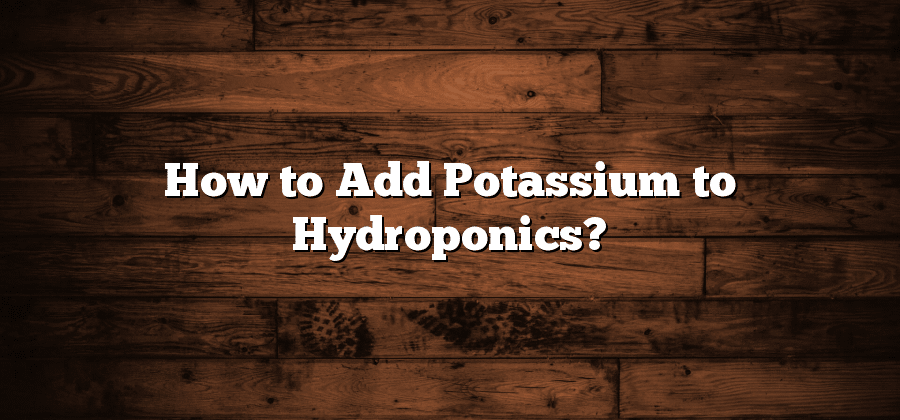Understanding the Importance of Potassium in Hydroponics
Potassium plays a vital role in hydroponic systems, as it is an essential nutrient for plant growth and development. It functions as a key regulator of various physiological processes, including photosynthesis, protein synthesis, enzyme activation, and osmotic regulation. By ensuring an adequate supply of potassium, hydroponic growers can promote robust plant growth, better fruiting, and overall healthier plants.
One of the primary functions of potassium in hydroponics is its involvement in photosynthesis. It is a crucial component of the enzyme system responsible for the conversion of light energy into chemical energy, enabling plants to produce glucose and other vital organic compounds. Additionally, potassium aids in the opening and closing of stomata, the tiny pores on the plant’s leaves responsible for gas exchange. This helps regulate the plant’s water balance and allows for the efficient uptake of other nutrients. In hydroponic systems, where plants rely solely on nutrient solutions, providing an appropriate amount of potassium ensures optimal photosynthesis and overall plant vigor.
Identifying Potassium Deficiency in Hydroponic Systems
When it comes to hydroponic systems, maintaining optimal nutrient levels is crucial to ensure healthy plant growth. One of the essential nutrients that plants need is potassium. Potassium plays a vital role in several physiological processes within plants, including protein synthesis, enzyme activation, and photosynthesis. Therefore, it is crucial to identify any potassium deficiency that may arise in hydroponic systems.
One of the most common signs of potassium deficiency is chlorosis, which is the yellowing of leaves. In the case of potassium deficiency, the chlorosis typically starts at the leaf margins and progresses inward towards the center. The leaves may also develop necrosis, which is the death of leaf tissue. Other symptoms of potassium deficiency include stunted growth, weak stems, and reduced yields. To accurately diagnose potassium deficiency, it is essential to monitor the plants closely and conduct regular nutrient testing.
Selecting Potassium-Rich Nutrient Solutions for Hydroponics
Selecting the right nutrient solution is crucial for the success of a hydroponic system, and potassium is one of the essential elements that should be included. Potassium, or K, plays a vital role in the overall health and development of plants. It helps regulate plant metabolism, strengthens cell walls, and enhances nutrient uptake. Therefore, it is important to choose a nutrient solution that is rich in potassium to provide plants with the necessary nutrients they need to thrive.
When selecting a potassium-rich nutrient solution, it is essential to consider the specific needs of the plants you are growing. Different plants have different potassium requirements, so it is important to research and understand the optimal potassium levels for the specific crops you are cultivating. Additionally, it is also crucial to choose a nutrient solution that is well-balanced and provides a complete range of essential nutrients, including macronutrients and micronutrients, to ensure optimum plant growth.
Choosing the Right Potassium Supplements for Hydroponics
Potassium is an essential nutrient for plants in hydroponic systems, as it plays a crucial role in various physiological processes. When it comes to choosing the right potassium supplements for hydroponics, there are several factors that need to be considered.
Firstly, it is important to understand the specific needs of your plants. Different crops have varying requirements for potassium, so it is crucial to research and determine the optimal levels for your particular plants. This will help you select a potassium supplement that provides the right amount of this nutrient to support healthy growth and development. Additionally, considering the stage of growth is essential as the potassium requirements may vary during different phases.
Furthermore, it is crucial to choose a potassium supplement that is compatible with your existing nutrient solution. It should mix well and not create any undesirable chemical reactions or imbalances in the solution. It is recommended to conduct thorough research and consult with experts to identify the most suitable potassium supplements for your hydroponic system. Remember, choosing the right potassium supplement is a key aspect of ensuring the overall success and productivity of your hydroponic garden.
Incorporating Potassium-Rich Organic Matter in Hydroponic Systems
1. One of the key factors in the success of hydroponic systems is the availability of essential nutrients. Potassium, in particular, plays a crucial role in the growth and development of plants. While hydroponics typically rely on nutrient solutions for the necessary minerals, incorporating potassium-rich organic matter can be a valuable addition to enhance nutrient availability.
2. Organic matter, such as compost or well-rotted manure, contains a range of essential nutrients, including potassium. When added to hydroponic systems, organic matter slowly releases potassium into the nutrient solution, providing a sustainable source of this crucial element. Additionally, organic matter improves the overall nutrient holding capacity and water retention of the growing medium, promoting better nutrient uptake by plants. Care should be taken to ensure that the organic matter is properly composted or aged to avoid introducing any harmful pathogens or imbalances in the nutrient solution.






